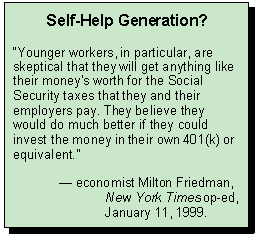 |
||||||||||||||||||||||||
|
||||||||||||||||||||||||
 |
||||||
|
||||||
 |
||||||||||||||||||
|
||||||||||||||||||
 |
|||||||||
|
 |
||||||||||||||||||||||||
|
||||||||||||||||||||||||
 |
||||||||||||||||||||||||
|
||||||||||||||||||||||||
|
What The Media Tell
Americans About Free Enterprise 
Risky Business Texas Governor George W. Bush has yet to formally announced his plan to reform the Social Security system, but journalists are already adopting some of Vice President Al Gore’s "risky business" rhetoric as they cast doubt on the notion of "privatizing" any portion of the retirement fund.
"Would you bet your Social Security on the stock market? Governor Bush says why not?" echoed NBC’s Tom Brokaw on the Nightly News that same evening. Journalists’ argument that Bush plans to recklessly gamble with citizens’ retirement money was, perhaps coincidentally, also the theme of Gore’s attacks on the not-yet-released plan. "Risky ideas that look good in good times don’t look so good when times change," Gore told NBC’s Claire Shipman on May 1. Yet for years, reporters have warned that the Social Security system is moving inexorably toward insolvency. "Here’s the basic problem," reported NBC’s Lisa Myers last June. "In 1950, there were 16 workers paying into Social Security for every senior receiving benefits. Now there are only three workers for each retiree. And in 2010, when 79 million baby boomers start to retire, there will be only two workers per retiree. That means in 35 years, by the year 2034, the system would be broke, able to pay only 71 cents of every dollar promised in benefits." There aren’t many remedies available to stave off bankruptcy, either. To maintain the current system, taxes could be raised even higher or benefits could be cut — either directly by slashing pension checks, or indirectly by raising the retirement age. The only other option would be to try to restructure the program to increase the rate of return on Social Security’s nest egg (which has averaged less than one percent per year since 1970, according to Peter Ferrara, chief economist of Americans for Tax Reform), and one way to do that is to invest the money in the stock market, as most private pensions systems do. Writing in the New York Times last year, economist Milton Friedman explained "Social Security has become less and less attractive as the number of current recipients has grown relative to the number of workers paying taxes, an imbalance that will only get bigger. That explains the widespread support for individual investment accounts. Younger workers, in particular, are skeptical that they will get anything like their money’s worth for the Social Security taxes that they and their employers pay. They believe they would do much better if they could invest the money in their own 401(k) or equivalent." If journalists are right in arguing that the present Social Security system is in need of radical reform before the baby boomers retire, then one could easily argue that obstructing such reforms is what’s truly "risky."
Home | News Division
| Bozell Columns | CyberAlerts |
||||




 "Bush
says let Americans bet their future Social Security income on Wall
Street; Gore says bad idea," teased Dan Rather at the top of
Monday’s CBS Evening News.
"Bush
says let Americans bet their future Social Security income on Wall
Street; Gore says bad idea," teased Dan Rather at the top of
Monday’s CBS Evening News.